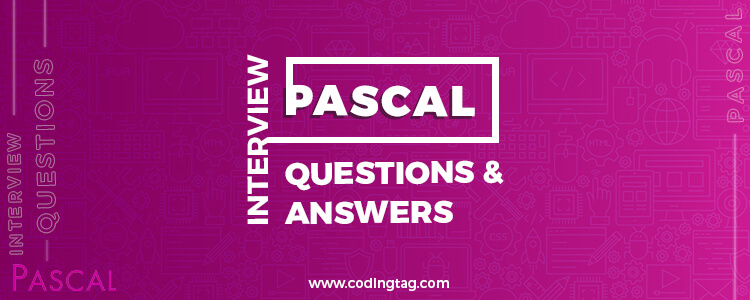Pascal Interview Questions
Last Updated by Shikha Sharma
0 3841
Hello..!!
I hope you have read my previous blogs on interview questions, if not you can visit and also share with your mates to help them with the updated interview questions.
Anyways, let's now proceed with today's blog that I prepared for updates on Pascal Interview Questions 2020. And if I miss any question in this blog, you can comment and I will surely update that in my blog.

We are living in an era where things keep on changing every day. And it goes the same for the interview questions. So I am writing the updated questions for the job seekers and will also help to bring down your labor and difficulty.
Also, I have tried to keep it simple and these questions are helpful for both fresher as well as an experienced person.
Let's get started
1) What do you understand about Pascal?
Well, Pascal is a high-level programming language which is a small yet efficient programming language that is responsible for supporting the data structure and structured programming language.
2) Who is the inventor of Pascal?
Niklaus Wirth is the inventor of Pascal and he developed this programming language in the year 1970.
3) Mention the features of Pascal?
The features of Pascal are as follows:
- Extensive error checking feature
- Simple and easy approach
- Holds up the object programming language
- Multiple data structures
- Structured programming language
4) What are the different pointer types we are using in Pascal?
Different pointer types we use in Pascal are
Record pointer - responsible for recording the subfiles that are being used
Reference pointer - examines the reference to the variables that are created dynamically
Associate pointer - consists of an associated data type to examine the compatibility of the data type with another type.
5) What is the current configuration supported by Pascal?
Pascal supports the current configuration
Windows /95/98/ME/NT/2000/XP Linux/86
6) What syntax we can use to declare a constant in Pascal?
We can use the mentioned below syntax to declare a constant in Pascal
Const Indentifier=constant_value;
7) Which data types are included in Pascal?
The data types included in Pascal are:
- Integers
- Real Numbers
- Char Data Type
- Boolean Data types
8) Can you differentiate between Modern Pascal and Standard Pascal?
The major difference between Modern Pascal and Standard Pascal can be understood with the help of given below table:
| Modern Pascal | Standard Pascal |
| In Modern Pascal, backward computability with the parameters can be attained | Backward compatibility is not supported in Standard Pascal |
| A definite type of compatibility is attained with the symbols in Modern Pascal | Nothing is associated with the symbols included in Standard Pascal |
| Less ambiguity and more security is achieved while programming with Modern Pascal | More ambiguity and less security is achieved while programming with Standard Pascal |
| Var parameter is provided which is used to make an advantage over Modern Pascal | No Var parameter is provided by Standard Pascal |
| The limit over the symbol length is removed in Modern Pascal | The limit over the symbol length is not removed in Standard Pascal |
9) How is a string declared in Pascal?
In Pascal, strings refer to the sequence of characters with an optimal size perquisite. These characters may include strings, numbers of whitespace as a whole.
In Pascal, there are different methods which can be used to declare a string such as:
- As a string variable
- As a character array
- As a short array
- As an AnsiString
- As a null-terminated string
10) Why are UNITS preferably used in PASCAL?
There are various benefits of using UNITS in PASCAL such as:
- UNIT is used to split the large programs into smaller sections, which makes it easier to be handled
- It can be used to use the same code into other programs again, making the coding simpler
- UNIT can be used to easily call the codes
11) What is constant in Pascal? What different constants are declared in Pascal?
Constant refers to the entity which remains unchanged throughout the program execution.
The constants which are declared in Pascal are:
- Char
- String
- Real types
- Pointer types (if nil values are allowed)
- Ordinal types
- Set types
12) Mention the two REPORT methods in Pascal to attain portability.
The two REPORT methods which are used in Pascal to attain the portability are:
- A compiler which is used to compile the language with the embedded features to determine the type compatibility while working with Pascal
- An application which is used to implement the features in accordance with the compiler, making it more compatible
13) Define the control structures used in Pascal.
Pascal generally attains structured programming in order to demonstrate the flow of control.
The various control structures used in Pascal are:
- The goto statement is used in Pascal which is used to return the control of the program to the main in a recursive manner
- Loops are used in Pascal to present the statement and the assignment operator to assign values to the variables
- Semicolons are not necessary to be included in terms of ending a single line in Pascal
14) How are semicolons used as separating parameters in Pascal?
- Semicolons determine the termination of a statement so that the next statements can be executed
- Semicolons are not used while working with the case or block statements as they are executed in a continuous flow
- Semicolons are not used before a keyword because it demonstrates the record type declaration
- Using more than one statement for defining a statement is applied upon by semicolon
15) Define the different types of loops in Pascal.
The different types of loops in Pascal are:
- Pretest used to tests a Boolean expression and going into the loop if true is returned
- Posttest which tests the Boolean expression after the loop is executed
- Fixed Repetition which repeats as per the fixed number of time
Conclusion:
In a nutshell, it is not a difficult task to crack the Pascal interview in 2020 until or unless you prepare well. So let's get a head start to fetch your desired career option.
For any left out questions, please comment below and I would like to hear from your side.
At last keep connected.

Share:








Comments
Waiting for your comments